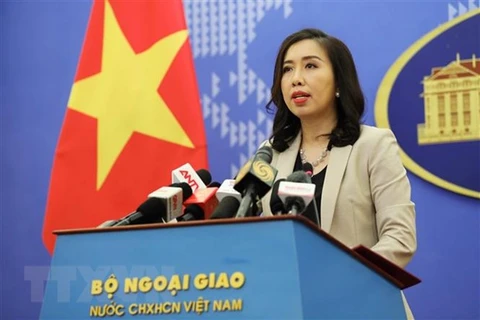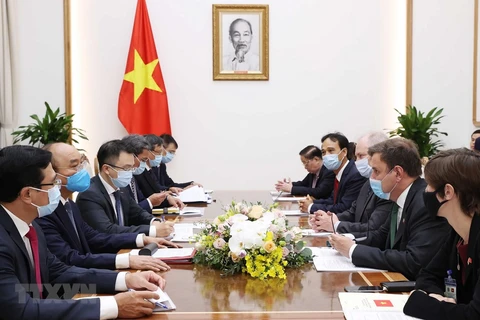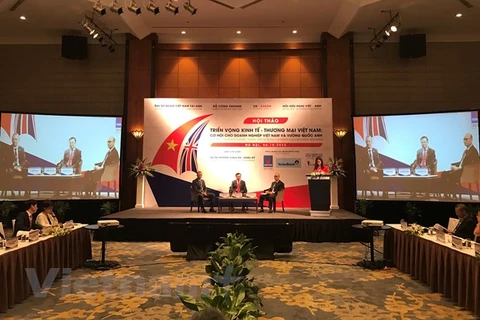 Free trade agreements open up opportunities for businesses to connect customers and increase exports (Photo: VietnamPlus)
Free trade agreements open up opportunities for businesses to connect customers and increase exports (Photo: VietnamPlus)
Hanoi (VNA) – Trade between Vietnam and the United Kingdom have significantly risen in recent times, even during the period of the UK’s withdrawal from the European Union (EU).
The two countries’ goods are complementary to each other and the prospects for bilateral trade development in the coming time are very good, Nguyen Khanh Ngoc, deputy head of the European - American Market Department under the Ministry of Industry and Trade told media.
- Could you tell us about the potential of the two-way trade between Vietnam and the UK as well as how does Vietnam tap the potential?
Vietnam and the UK set up the diplomatic ties in 1973. In 2010, the two countries signed the strategic partnership agreement, and since then bilateral exports have been continuously increasing.
Bilateral trade rose 3.5 times over the past 10 years to 6.2 billion USD in 2017, and increased to 6.6 billion USD in 2019.
Thus, it can be said that bilateral trade between Vietnam and the UK has posted good growth over the past years. In the 28-nation EU, the UK is Vietnam's third trading partner, behind Germany and the Netherlands.
Vietnam has always enjoyed a trade surplus with the UK, with the average figure hitting 5 billion USD a year. In terms of trade, the two countries’ goods are supplementary to each other.
Vietnam mainly exported vegetables and fruit, seafood, cashew nuts, garment and textiles, and footwear to the UK. In Vietnam’s export structure, electronic products to the UK account for 25-30 percent of the total exports, as same as the volume of the items to other partners.
 Nguyen Khanh Ngoc, deputy head of the European – American Market Department under the Ministry of Industry and Trade. (Photo: VietnamPlus)
Nguyen Khanh Ngoc, deputy head of the European – American Market Department under the Ministry of Industry and Trade. (Photo: VietnamPlus)
Vietnam mainly imports machinery, equipment, tools, high-tech products from the UK. They are Vietnam’s needs for domestic production and consumption.
So, with the supplementary feature, I think the prospects for bilateral trade development in the coming are very good.
Numerous comments say that with the UK’s withdrawal from the EU, Vietnam will lose many trade opportunities in the market because during the EVFTA negotiation process, the UK is also a member and a market with great potential for Vietnamese goods. What is your opinion?
Some opinions say that there may be difficulties brought by from the UK’s withdrawal from the EU, but the two sides are trying to overcome and tap their strengths to enhance bilateral cooperation.
Reality in recent years, Vietnam has always enjoyed a trade surplus with the UK, with the averagely figure hitting 5 billion USD a year. In the first eight months of 2020, (or called eight months of Brexit), Vietnam also recorded a trade surplus of 3 billion USD.
Notably, amidst the complicated developments of the COVID-19 pandemic, the growth of Vietnam's trade with the UK has been still good. The two sides have being also working hard to unlock each other’s potential in the context of still taking advantage of the previous incentives of the EVFTA and the two sides have complementary advantages.
Vietnam and the UK are speeding up negotiations on the bilateral free trade agreement (FTA). How will this open up opportunities for the two sides’ economic cooperation?
Not only with Vietnam, in the context of Brexit, the UK is also promoting negotiations with other partners.
Currently, the two sides agreed to conduct negotiations to sign the Vietnam-UK FTA on the basis of the FTA between Vietnam and the EU.
For technical matters, such as the previous EU incentives for Vietnam, the two sides need to specify so as to have incentives for bilateral cooperation between the two countries.
Some other technical issues such as the UK as a separate entity and some differences between the UK and EU are matters that the two sides are trying to speed up to conclude the FTA negotiations soon.
Both sides also hope that with their efforts, the negotiation would be completed at this year’s end.
However, in the case that the two sides cannot conclude the final negotiations by the end of this year, with the current good bilateral relations, I believe that the two sides will apply mutual incentives to each other during transitional period until the final agreement of the Vietnam-UK FTA is reached.
Along with import-export activities, the UK is also a big investor in Vietnam, ranking 16th among 137 foreign investors in the Southeast Asian nation. What are your assessments of opportunities for Vietnamese businesses?
The UK is a developed country, with strengths on high-tech, sci-tech development and traditional fields like healthcare, financing, insurance and banking.
Currently, among the UK’s projects in Vietnam, seven are in mining with a total registered capital of 715.6 million USD, 55 in processing and manufacturing with a total registered capital of 714.4 million USD, property business with 548 million USD. They are followed by projects in banking, financing and insurance areas.
British companies investing in Vietnam are major corporations in the world, such as BP, BHP Billiton, aircraft engine manufacturer Rolls-Royce, HSBC Bank, Prudential. Standard Chartered Bank and HSBC Bank are two first wholly foreign invested banks to be established in Vietnam.
I think in the coming time, the two sides will continue accelerating the negation of the Vietnam – UK FTA so that the deal will be signed and take into effect soon.
Vietnam will propose the UK continue its assistance to develop the green energy field via sharing knowledge and supporting the implementation of energy-saving programmes and renewable energy projects in Vietnam.
Besides, through their joint committee, the two sides will work together to review activities of projects in Vietnam, and difficulties that British firms could face, thereby the Vietnamese Government to have prompt support measures and create conditions for the UK’s investment.
Thank you!./.























